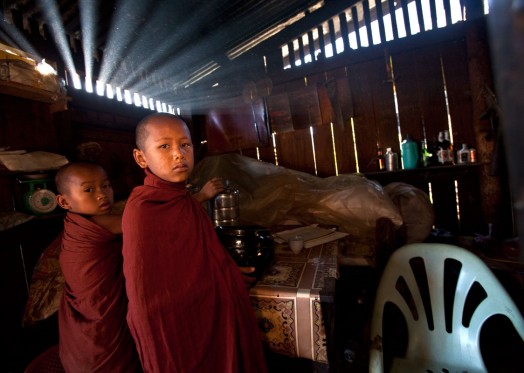Burma days

Travelling to the restive northeastern Shan state is somehow easier these days if you don’t ask for official permits and use alternative ways. I went to Hsipaw by car, then arranged a trip to the Shan mountain villages: a reckless six hours motorbike ride in the backseat (“Mr. Bike” was at the wheel, he’s from the place) up on narrow swirling stony bumping steep tracks. We never bumped into military checkpoints, though. And hill after jungle hill, past abandoned opium fields and huge banyan trees, crossing rivers and suspended bridges, meeting monks at the golden pagodas and Li Shu hunters in their bamboo huts, we finally landed in Mr. Bike’s Palaung village: a cluster of pine wood spacious stilt houses, proudly guarded by a Buddhist monastery and four shining gilded stupas. The night was pitch black as we sat talking and eating rice at the fireplace: smoke spiralling through the corrugated roof, barking dogs and silent rows of armed militiamen on the mountain trail.
I only see women and children in the village, old men and a few monks: some of the youngs are working in the corn and tea plantations, but most of them are with the Shan State Army. The war has gone on and off for decades in these hills: there are mine fields in the jungle and I am told of burned houses, of clashes with the Burma Army, abductions, ethnic harassment, human rights violations.
President Thein Sein is pushing for a nationwide ceasefire agreement and a new round of negotiations with the leaders of the armed groups is scheduled for next January. But the federalist proposals put forward by the ethnic minorities seeking autonomy are likely to be rejected by the Myanmar government and have been only lukewarmely embraced even by the opposition icon, Aung San Suu Kyi.
For the past two centuries Burma – a British colonial creation – has experienced civil wars among the multitude of ethnic nationalities and no government has ever been able to control the northern runaway border regions. Even during the current peace talks the military operations launched by the Burma Army in the Kachin state have displaced thousands of civilians. The ethnic conflict that has plagued the country since independence in 1948 is set to undermine Myanmar’s path to democracy and economic recovery.





